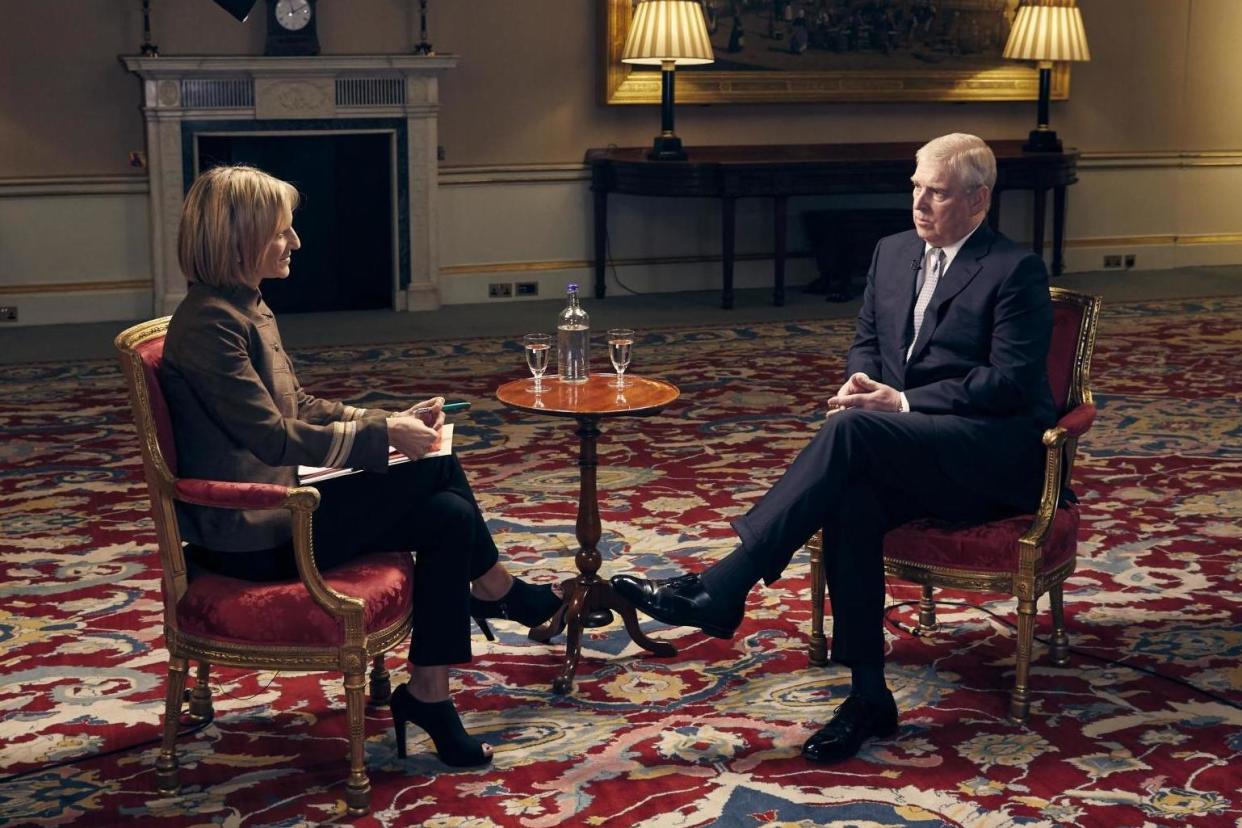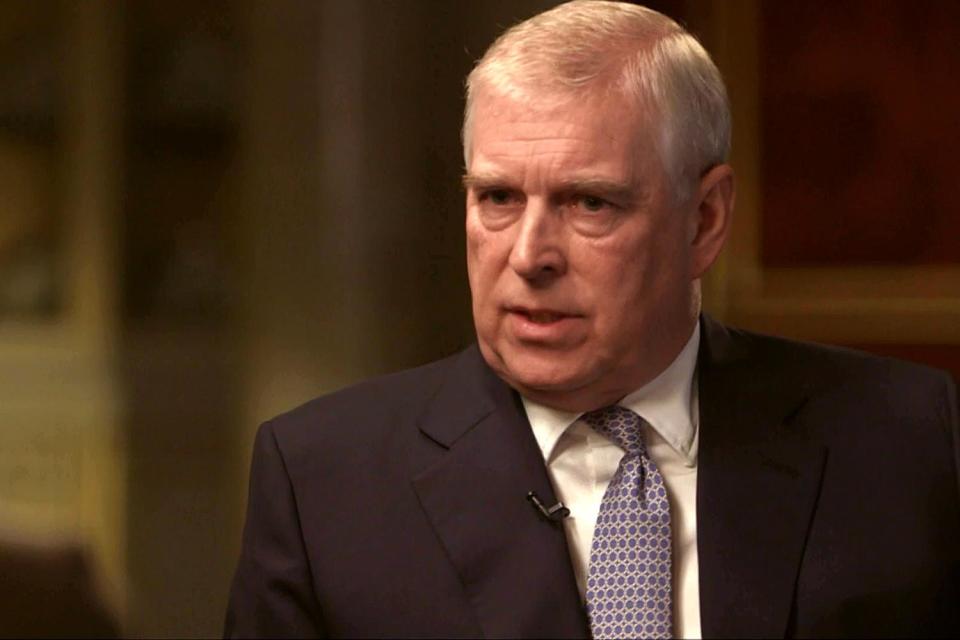It’s not just a PR disaster — Prince Andrew’s plight is a warning for the monarchy

Zooming straight in at Number One in the hit parade of PR disasters comes Prince Andrew’s TV interview . The impact of a foolhardy conversation about his heedless friendship with the late Jeffrey Epstein has not only proved a giant misstep for the Duke of York. It is a perilous one, too, for a royal family which, outside its core of the Queen and a frail Prince Philip, often looks strained and directionless.
The interview with Emily Maitlis — excusing his loyalty to Epstein, a convicted sex offender, as the result of his “honourable” nature —saw a senior royal carve himself up in a series of infelicitous language: “unbecoming” as a euphemism for sex crimes, “convenient” as a grating excuse for exploiting the offer of free accommodation in Manhattan. Meanwhile, according to Rohan Silva, a former Downing Street adviser, as reported in this paper, Prince Andrew had casually used a racist word in conversation. The Palace has strenuously denied the claim.
Arriving in New York yesterday, I found the transatlantic jury as punitive as the domestic court of opinion. “His Royal Dryness” was the New York Post’s take on the sweat-related excuse he mustered to explain why he could not have been dancing with the woman who has accused him of having sex with her as a teenager the same night.
Calls for him to speak to the FBI will grow more insistent. More depositions, including a crucial one from Epstein before his suicide, made with an eye to plea-bargaining, will keep the pot boiling. Already “Pitch@ Palace”, the entrepreneurial charity the Duke of York supports, has seen two key sponsors shed his patronage.
Yet when we have finished telling ourselves how dim and deluded Andrew is, there is broader picture to a story of greed and seediness. No doubt, he is getting the drubbing he deserves. But the Epstein story in its seedy self-
indulgence is a morality tale of the early 21st century. Over a decade, the “wealth manager” (New York’s favourite job) shapeshifted from the party-giving toast of the wealthy host to two presidents (Clinton and Trump) — to despised abuser of young girls. The line between notorious “party person” and something darker tends to be policed more actively when the party is over. Plenty of people suspended disbelief about the Epstein milieu. As the old Manhattan saying goes, “If it’s not about the money, it’s all about the money.” A roster of well-connected folk quelled their queasiness about his reputation, in the same way they did about everyday examples of sexual harassment.

In this miasma, Andrew has behaved very foolishly. That does not mean all notions of fairness should be suspended however. So a small part of me rises up against the “PR disaster” gloating. For a start, it implies that what a famous person really needs when the trouble hits is a better script to stick to and more ruthless damage limitation. The failure he stands most roundly condemned for is omitting sympathy or awareness for the young women and girls who suffered abuse. The real collateral damage is to the girls and women Epstein and his sidekicks exploited.
I wince at the implication that, had the Duke of York reeled off a slick set menu of thoughts-and-prayers regrets, he would have been less culpable or more moral. The “apology tour” is having its moment in the US, from Joe Biden’s sort-of sorry — or at least his “being more aware” of women’s personal space — after accusations of unwanted touching, to Michael Bloomberg announcing this week that he regrets the impact on ethnic communities of his stop-and-search policy when mayor of New York. Does anyone think this would be happening if Biden and Bloomberg were not preparing a run at the Democratic nomination?

In the Duke of York’s case, the cries of the righteous bear some resemblance to the howls of the mob. Put simply, we do not know if Virginia Roberts Giuffre’s allegation of having had sex with Prince Andrew when she was 17 (considered a minor in Florida), and at Epstein’s behest, are true or not. However muddled his account, he is emphatic in denying these charges. Prince or pauper, anyone accused of a crime is entitled to clear their name. So sneering at the pizza-night alibi is the wrong path. If he can prove he was not at a place where he is alleged to have been, and therefore not doing things he is accused of doing, he should be given a hearing to say so. Perhaps the alibi will turn out to be flawed or half-remembered or misleading — but it breaches the basic principles of justice not to take seriously evidence offered in self-defence. If we would want it for ourselves or a loved one in trouble, we should accept a royal has the same right.
The Duke of York’s self-involvement and painfully limited bandwidth are self-evident. Still, of the senior royals I have fleetingly met covering stories, Andrew struck me as the least curt and most open to unstilted conversation. Stranded a few years ago at a party for a US dignitary without enough A-list guests to go round, we ended up speculating on what sort of journalists the royals would be — he thought a diarist might be his calling. His mother would “write very well about horses”. And his elder brother? Tartly: “Oh definitely an op-ed writer with lots of views…”
Of course, being vaguely pleasant in party situations is not a full-time job and it’s hardly a secret that the “firm” has struggled to find a role for the Queen’s second son beyond trade delegations and medal-giving. The deeper conundrum is what happens when an institution that works by lineage and hierarchy cannot find roles for the spare parts. If the monarchy is to thrive, it will need to be leaner and refocus on its duties of looking outwards while lifting spirits and rallying a disunited nation at home — avoiding the present trap of appearing a lot more engaged in foreign tours.
Coming hard on the heels of the Sussexes soul-baring, the Duke of York’s misadventures reminds us of how fragile and fluctuating the royal story is. The official version is that Prince Andrew will clear his name and resume duties. The unofficial truth is that there will be rather fewer takers for this brand of royal stardust, either side of the pond.
Anne McElvoy is senior editor at The Economist

 Yahoo News
Yahoo News 
